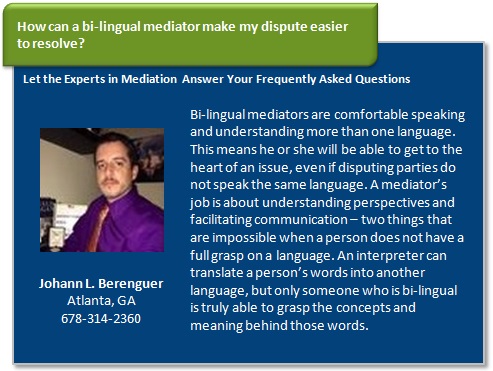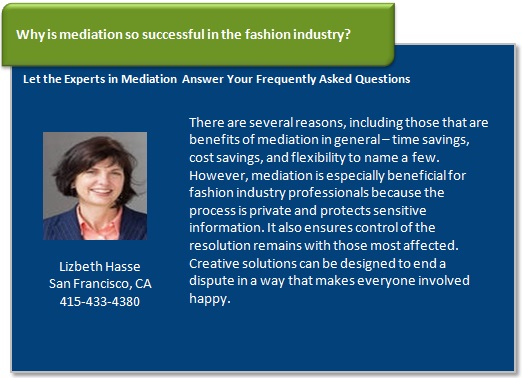
Involved in a Copyright Dispute? Try Mediation!
Mediation can be one of the most effective ways to settle a legal dispute concerning copyright issues. Not only does the process save time and money, avoiding the inefficiency and expense of litigation, it also provides a number of other features that are unique suited to copyright issues.
Copyright mediation is a confidential process. Unlike litigation where everything discussed during the process is done in open court in front of the public and the details of the final outcome are a matter of public record, mediation is private. Discussions are held in private and only those who are a part of the mediation know the details of those discussions. And if mediation is unsuccessful, the information that was part of the failed mediation remains confidential. This is especially important when it comes to copyright issues that could involve sensitive proprietary information.
Mediation is also controlled by the disputing parties. They participate in negotiations overseen by the mediator and they determine whether or not a resolution is viable. They have the flexibility to design a solution suited to their specific circumstances – something that is not always an option in the courtroom. And only when both parties agree a resolution is acceptable is the mediation considered a success.
The process of mediation is led by a mediator chosen by the disputing parties. This means they have the ability to pick someone to oversee the process who is suited to their needs. Many mediators specialize in specific types of mediation and there are those who are experts in the copyright process. A mediator might be an attorney or judge who has spent time studying and working with copyright, which ensures he or she will have the knowledge and experience needed to guide parties toward an acceptable resolution.
It is easy to see why mediation is so often the preferred method for settling copyright disputes.
Bi-Lingual Mediation: It’s about More than Just Translation
At the heart of mediation is communication. When that communication breaks down and either party involved in the dispute is unwilling or unable to speak openly and honestly about the issue, mediation comes to a standstill and other dispute resolution methods will likely be needed to settle the matter. Unfortunately, mediation can be challenge enough when disputing parties speak the same language. When there is a difference in language and one party is unable to understand the other, things can get especially complicated. This is where an expert in bi-lingual mediation can help.
Bi-lingual mediation is about more than just interpreting the words a person is saying. Much of the communication that moves mediation forward involves the thoughts and concerns of both parties. Unless these concerns are addressed fully, negotiations can fail. Merely having a language interpreter to help during the mediation session is typically not enough. A skilled mediator who is fluent in the languages used by the disputing parties can provide a bridge problem to solution.
Since the mediator understands each language spoken by those involved in the dispute, he or she is able to fully understand the intention of the words used. This understanding is an essential part of a successful mediation. In order for a mediator to help parties move from utter disagreement to a willingness to negotiate to a resolution, a comprehensive view of everything involved in the dispute is needed. Only when the mediator truly understands the case of each side is he or she able to do a thorough and effective job.
Finding an expert in bi-lingual mediation is growing easier and easier, as more and more mediators realize the value in speaking and understanding more than one language. If you are involved in a dispute and you or the other party speaks a language other than English, it is essential you find a mediator comfortable working in a bi-lingual environment.
How to Help Clients Choose the Best Asset Distribution Option
In general, people have four options when it comes to estate planning and distributing their assets. They can gift all or a portion of their assets before they die, establish a trust while they are alive, distribute assets through their will after they die, or distribute assets outside of their will after they die. Often, the best option is actually more than one option, but this is going to vary from situation to situation.
Choosing the Best Method of Asset Distribution
So how do you help someone determine what the best asset distribution method is for them and their family?
First, a person must consider his or her financial situation, as well as the applicable tax rate. What might be advantageous in one tax bracket could be disastrous in another. Any plan for asset distribution first and foremost must minimize fees and taxes as much as possible.
Once the method of distribution is determined, it is best to choose the beneficiaries. This is entirely up to each individual and for many, it can be an emotional process. There is a fine line between advising and interfering when it comes to helping someone choose beneficiaries, so any one doing so should tread carefully.
The Unique Situation with Spouses
When it comes to one spouse leaving all of his or her assets to the other spouse, there are a few additional options available for distribution. Laws vary from state to state, but in general, options include joint tenancy, which occurs outside of the will and avoids probate, and the simple will, which leaves all assets to the spouse. Joint tenancy and simple wills offer no protection for children because the surviving spouse is free to do as he or she choose with the assets once they have transferred. When protection for children is needed, a complex will is the better option because it directly property to the children while still allowing the surviving spouse to use that property.
June 19, 2015
Foreclosure activity moving higher again – The report shows foreclosure filings, which include default notices, scheduled auctions and bank repossessions (REO), were up 1% in May from April but a more attention-getting 16% over May 2014, a 19-month high.
Average US Rate on 30-Year Mortgage Eases to 4 Percent – Average long-term U.S. mortgage rates eased this week after hitting their highest levels this year in the previous week.
New bitcoin technology can tell banks where coins come from with incredible accuracy – Elliptic, a bitcoin analytics and storage startup based in London, thinks it’s just made a huge breakthrough that could make banks way more interested in bitcoin.
Lizbeth Hasse

Mediation Makes It Possible to End Contentious Disputes in the Apparel Fashion Industry
 Mediation is used in the fashion apparel industry to resolve civil and commercial disputes that arise between people working in the industry. It can be used for international and domestic disputes, and is a voluntary process that makes it possible to protect the mutually beneficial relationships that have been forged over time.
Mediation is used in the fashion apparel industry to resolve civil and commercial disputes that arise between people working in the industry. It can be used for international and domestic disputes, and is a voluntary process that makes it possible to protect the mutually beneficial relationships that have been forged over time.
One of the most important factors in a successful fashion industry mediation is the mediator. Skilled mediators should not only be effective communicators and able to manage a mediation session, they should also be experts in the fashion industry. This eliminates the need for lengthy and time-consuming explanations of the issues in the dispute. Parties can simply begin by focusing on the potential resolutions to the problem they face.
Many professionals in the fashion industry include mediation clauses in their contracts, so mediation is the first line of defense when a dispute arises. This ensures disputing parties have a quick, simple, and affordable method in place to help them resolve problems. It is still possible for parties to pursue arbitration or litigation should mediation fail, but the starting point gives them an opportunity to settle the dispute in the most efficient way possible.
Mediation is the only means for resolving a dispute in which you can be in control of the outcome. It guarantees that even if parties do not receive everything they want, they will have a say in the resolution and be at least partially satisfied with the end result.
A final benefit of mediation in the apparel and fashion industry is its ability to keep private issues private. Mediation is completely confidential, so the sensitive and proprietary information of those involved does not become a matter of public record. Everyone can walk away from the dispute happy with not just the outcome, but also the process.




